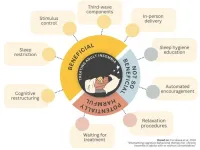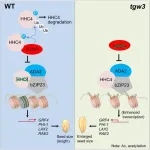(Press-News.org) The American Society for Biochemistry and Molecular Biology today named Mona V. Miller its next chief executive officer, effective April 1.
Miller is an experienced association leader with significant experience in strategic planning, advocacy and fundraising. Most recently, she was CEO of the American Society of Human Genetics. Before that she held multiple high-level positions at the Society for Neuroscience.
Miller said she was drawn to the ASBMB because “scientifically, biochemistry and molecular biology is at the forefront of knowledge that is transforming health and society.”
She said she looks forward to “focusing on the pivotal role of fundamental science and highlighting its inherent wonder and importance, its irreplaceable role as a foundation for downstream discovery and applications, and its centrality to economic growth and human advancement.”
Miller’s appointment follows an exhaustive, nationwide search process, conducted by a search committee.
Ann Stock, president of the ASBMB and chair of the search committee, said Miller rose to the top of a deep pool of highly qualified candidates. “The committee sought out someone who would be both a strategic thinker and an inspirational team manager,” Stock, a distinguished professor at the Robert Wood Johnson Medical School at Rutgers University, said. “With an impressive record of achievements in previous leadership roles, Mona checks these boxes and more.”
Miller is steeped in nonprofit strategy and fundraising. At ASHG, she launched the strategic planning process and led a multiyear implementation. At SfN, she obtained more than $2.4 million in grants to support Latin American scientists, women in STEM, scientific workforce diversity and scientific rigor.
Joan Conaway is the ASBMB’s president-elect, a member of the search committee and the vice provost and dean of basic research at the University of Texas Southwestern Medical Center at Dallas. She said the committee found Miller to be an innovative and thoughtful leader with the financial-management experience needed to lead the ASBMB into its next phase.
“Mona has a strong background in organizational leadership and financial management,” said Conaway, the society’s former treasurer. “As CEO of ASHG, she grew revenue by 25% by diversifying and securing new revenue streams. At SfN, she had direct responsibility for SfN’s financial management, including development and approval of its annual budget, reserve and membership revenue. She also led donor relations and oversaw annual meeting and journal finances.”
Miller has a bachelor’s degree in sociology from Tulane University, a master’s degree in public policy (concentrating in nonprofit management) from Harvard University and an executive education certificate in change management from New York University’s School of Business.
She started her career in communications, holding roles over six years at the American Women’s Economic Development Corporation, Planned Parenthood Federation of America and the office of U.S. Sen. Barbara Mikulski, D-Md. She then entered public affairs consulting, working for multiple firms and for herself for five years before joining the Pew Charitable Trusts in 2004.
Miller entered the scientific society sphere in 2007. She did communications and public affairs for SfN and was promoted to deputy executive director in 2012. She became CEO of ASHG in 2017 and remained there until November 2023.
Stock said ASBMB engages in a broad scope of activities that reflect the diverse interests of society members. “Mona’s previous experience in many different areas coupled with her passion for science will make her an effective partner with Council, staff and volunteers to advance initiatives to support our members,” she said.
Miller succeeds Stephen Miller (no relation), who is retiring March 31 after serving the society in several roles since 2004 and as its executive director since 2021.
About the American Society for Biochemistry and Molecular Biology
Founded in 1906, the American Society for Biochemistry and Molecular Biology (ASBMB) is a professional scientific organization located in Rockville, Maryland, with a storied history of advancing the mechanistic understanding of nature through promoting the highest-quality research in biochemistry and molecular biology. As an international nonprofit scientific society with over 11,000 members, it is one of the most important learned scientific societies.
The ASBMB is devoted to its mission of advancing science and scientific research, education, and the understanding of the molecular nature of life processes. It serves the scientific community through publications, meetings and events, education and professional development programs, advocacy, and diversity and inclusion initiatives.
END
ASBMB names Mona V. Miller as next executive officer
She takes the helm April 1
2024-01-17
ELSE PRESS RELEASES FROM THIS DATE:
Streamlining cognitive behavioral therapy for chronic insomnia
2024-01-17
A combination of cognitive and behavioral strategies, ideally delivered in person by a therapist, maximizes the benefits of cognitive behavioral therapy for insomnia (CBT-I), according to new research. CBT-I is a form of talk therapy, which can be delivered in person or through self-help guides. By analyzing 241 studies, involving over 30,000 adults, researchers identified the most beneficial components of CBT-I. These included: cognitive restructuring, third-wave components, sleep restriction, stimulus control and in-person delivery. Self-help with human encouragement could also be beneficial, while waiting for active treatment and enforcing ...
Prenatal opioid exposure and immune-related conditions in children
2024-01-17
About The Study: Prenatal opioid exposure was associated with an increased risk of infection, eczema and dermatitis, and asthma, but not allergies and anaphylaxis or autoimmune conditions in this study of 401,000 neonates. These findings highlight the importance of further study of opioid-induced immune changes during pregnancy, the potential impact on long-term health in exposed children, and the mechanisms of opioid-induced immune dysregulation.
Authors: Erin Kelty, Ph.D., of the University of Western Australia in Crawley, Western Australia, ...
Comparative effectiveness of psychotherapy vs antidepressants for depression in heart failure
2024-01-17
About The Study: In this comparative effectiveness trial of behavioral activation psychotherapy (BA) and antidepressant medication management (MEDS) in 416 patients with heart failure experiencing depression, both treatments significantly reduced depressive symptoms by nearly 50% with no statistically significant differences between treatments. BA recipients experienced better physical health-related quality of life, fewer emergency department visits, and fewer days hospitalized. The study findings suggest that patients with heart failure could be given the choice between BA or MEDS to ameliorate depression.
Authors: Waguih ...
Origin of intense light in supermassive black holes and tidal disruption events revealed
2024-01-17
A new study by Hebrew University is a significant breakthrough in understanding Tidal Disruption Events (TDEs) involving supermassive black holes. The new simulations, for the first time ever, accurately replicate the entire sequence of a TDE from stellar disruption to the peak luminosity of the resulting flare. This study has unveiled a previously unknown type of shockwave within TDEs, settling a longstanding debate about the energy source of the brightest phases in these events. It confirms that shock dissipation powers the brightest weeks ...
Astronomers detect oldest black hole ever observed
2024-01-17
Researchers have discovered the oldest black hole ever observed, dating from the dawn of the universe, and found that it is ‘eating’ its host galaxy to death.
The international team, led by the University of Cambridge, used the NASA/ESA/CSA James Webb Space Telescope (JWST) to detect the black hole, which dates from 400 million years after the big bang, more than 13 billion years ago. The results, which lead author Professor Roberto Maiolino says are “a giant leap forward”, are reported ...
Columbia chemists create the first 2D heavy fermion
2024-01-17
Researchers at Columbia University have successfully synthesized the first 2D heavy fermion material. They introduce the new material, a layered intermetallic crystal composed of cerium, silicon, and iodine (CeSiI), in a research article published today in Nature.
Heavy fermion compounds are a class of materials with electrons that are up to 1000x heavier than usual. In these materials, electrons get tangled up with magnetic spins that slow them down and increase their effective mass. Such interactions are ...
Therapy versus medication: comparing treatments for depression in heart disease
2024-01-17
New research by investigators from the Department of Psychiatry and Behavioral Neurosciences at Cedars-Sinai shows that behavioral activation therapy is as effective as antidepressant medications in treating symptoms of depression in patients with heart failure.
Heart failure affects nearly 6 million adults in the United States, and approximately 50% of heart failure patients experience symptoms of depression along with their condition. Past studies show patients with heart failure and depression have lower cardiac function, more emergency department ...
Active membranes: The future of fresh water is bright
2024-01-17
The growth of Los Angeles as a startup hub is highlighted by a robust and diverse entrepreneurial ecosystem within UCLA. The Magnify Incubator at CNSI is no exception to showcasing the range of early-stage businesses.
One such company within the Magnify incubator, Active Membranes, is innovating the future of fresh water through membrane desalination. As freshwater is becoming increasingly scarce around the globe, resources such as seawater and industrial wastewater are costly to procure and operate. The company’s patented technology is electrically conducting ...
What’s stopping US climate policies from working effectively
2024-01-17
In an effort to reduce greenhouse gas emissions and curb global warming, the U.S. has enacted several ambitious federal laws, such as the Inflation Reduction Act (IRA) passed in 2022 and the Infrastructure Investment and Jobs Act (IIJA) of 2021.
These provide significant investments in clean energy projects and encourage technological innovations. Some analyses suggest they could reduce greenhouse gas emissions by more than 40% below 2005 levels by 2030.
However, in a paper published Jan. 16 in the journal Nature Climate Change, researchers at the University ...
Chromatin modifier-centered pathway points to higher crop yield
2024-01-17
Chromatin is the complex of DNA and proteins that makes up the genetic material in the nucleus of eukaryotic cells. A chromatin modifier is a protein or complex of proteins that chemically modifies the structure of chromatin. Chromatin modifiers play a crucial role in regulating the expression of genes, which are segments of DNA strands, as well as in other chromatin-related processes. These modifiers mainly work by adding or subtracting chemical groups to histones, a type of protein within the chromatin, or to the DNA itself.
In the scientific effort to manipulate the expression of plant genes, such as for grain size or drought-resistance, etc., understanding the influence ...
LAST 30 PRESS RELEASES:
The Lancet: Single daily pill shows promise as replacement for complex, multi-tablet HIV treatment regimens
Single daily pill shows promise as replacement for complex, multi-tablet HIV treatment regimens
Black Americans face increasingly higher risk of gun homicide death than White Americans
Flagging claims about cancer treatment on social media as potentially false might help reduce spreading of misinformation, per online experiment with 1,051 US adults
Yawns in healthy fetuses might indicate mild distress
Conservation agriculture, including no-dig, crop-rotation and mulching methods, reduces water runoff and soil loss and boosts crop yield by as much as 122%, in Ethiopian trial
Tropical flowers are blooming weeks later than they used to through climate change
Risk of whale entanglement in fishing gear tied to size of cool-water habitat
Climate change could fragment habitat for monarch butterflies, disrupting mass migration
Neurosurgeons are really good at removing brain tumors, and they’re about to get even better
Almost 1-in-3 American adolescents has diabetes or prediabetes, with waist-to-height ratio the strongest independent predictor of prediabetes/diabetes, reveals survey of 1,998 adolescents (10-19 years
Researchers sharpen understanding of how the body responds to energy demands from exercise
New “lock-and-key” chemistry
Benzodiazepine use declines across the U.S., led by reductions in older adults
How recycled sewage could make the moon or Mars suitable for growing crops
Don’t Panic: ‘Humanity’s Last Exam’ has begun
A robust new telecom qubit in silicon
Vertebrate paleontology has a numbers problem. Computer vision can help
Reinforced enzyme expression drives high production of durable lactate-based polyester
In Rett syndrome, leaky brain blood vessels traced to microRNA
Scientists sharpen genetic maps to help pinpoint DNA changes that influence human health traits and disease risk
AI, monkey brains, and the virtue of small thinking
Firearm mortality and equitable access to trauma care in Chicago
Worldwide radiation dose in coronary artery disease diagnostic imaging
Heat and pregnancy
Superagers’ brains have a ‘resilience signature,’ and it’s all about neuron growth
New research sheds light on why eczema so often begins in childhood
Small models, big insights into vision
Finding new ways to kill bacteria
An endangered natural pharmacy hidden in coral reefs
[Press-News.org] ASBMB names Mona V. Miller as next executive officerShe takes the helm April 1





